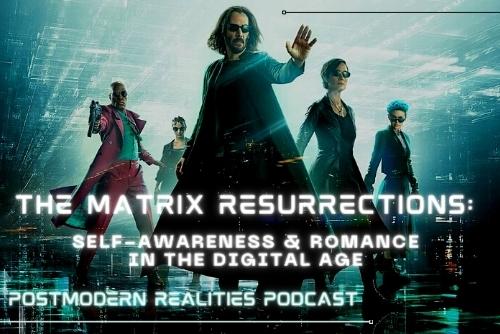
In 1999, the world was in a different place. Y2K loomed, personal computerized technology was still coming into its own, and September 11 was just another day. And into this world the Wachowskis came running and gunning with their runaway Academy Award-winning hit, The Matrix, changing the landscape of what brainy, science-fiction, action-adventure movies could be, seemingly overnight. Now, more than two decades later, that original film still holds up as one of cinema’s most innovative and breathtakingly imaginative achievements. Now Neo and Trinity and the Matrix are back in this new film The Matrix Resurrections. One of the highlights of Resurrections is its overt self-awareness. In the age of Marvel and the quippy, breezy, ironic, self-referential blockbuster Resurrections takes the self-awareness to a whole new level, and then kicks it up a few more notches to make a point. In other words, all the pop philosophy that rattled the cage in the original has been exchanged for irony and self-aware storytelling — which itself is ironic considering the age of the blockbuster in which we currently live. Whether or not Resurrections scratches your mind-bending sci-fi itch, there is a certain brazen boldness to making a modern sequel in a way that calls attention to (and critiques) how modern sequels are made using the same techniques modern filmmakers use in the making of said sequels. But it would be a grave mistake to characterize Resurrections singularly as a “meta” movie. The film does interact with the current cultural climate in the way the original film interacted with the culture surrounding emerging technologies. Beyond the critique of modern blockbusters, Resurrections takes the messianic overtones the previous trilogy employed and brings Neo’s character arc more closely in line with the Christ narrative of Scripture. Make no mistake, Resurrections is a sequel, not a reboot — the story continues with Neo’s resurrection. This is in an in-depth conversation with JOURNAL author Cole Burgett about the new film The Matrix Resurrections.
This Postmodern Realities episode is a conversation with Journal author Cole Burgett about his online-exclusive article, “The Matrix Resurrections: Self-Awareness and Romance in the Digital Age.” **Editor’s Note: This article and podcast contains spoilers for The Matrix Resurrections.
Starting in February 2021, all online-exclusive articles, have had a early access window for Journal subscribers only before being made public. Given the time sensitive nature and global importance of this subject, our editorial board decided to make this available to the public as soon as possible. Also consider this a free preview of the quality and in-depth research that goes into our online-exclusives. To learn more about subscribing and gaining early access to future online-exclusive articles, please see our FAQ section on Early Access to Online-Exclusive Articles by clicking here and subscribing by clicking here.
We’d also like to invite you to subscribe to the Journal. To subscribe to the Journal, please click here.
When you to subscribe to the Journal, you join the team of print subscribers whose paid subscriptions help provide the resources at equip.org that minister to people worldwide. These resources include our ever growing database of over 1,500 articles, as well as our free Postmodern Realities podcast.
Another way you can support our online articles is by leaving us a tip. A tip is just a small amount, like $3, $5, or $10 which is the cost for some of a latte, lunch out, or coffee drink. To leave a tip, click here
Other articles and Postmodern Realities podcasts:
Our previous article on the original Matrix Trilogy.
The Matrix: Unloaded Revelations
Other articles and podcasts with Cole Burgett:
Episode 263: Free Will, the Power of Choice, and Skin in Eternals
Episode 261 Dune and the Future of the Science Fiction Epic
Dune and the Future of the Science Fiction Epic
Episode 259: All the Time in the World: No Time to Die and the End of an Era
All the Time in the World: No Time to Die and the End of an Era
Episode 251 Growing Up and Letting Go in CODA
Growing Up and Letting Go in CODA
Episode 242: Friendship and Fatherhood in Pixar’s Luca
Friendship and Fatherhood in Pixar’s Luca
Episode 239: No Us Without Him: The Life, Death, and Resurrection of Zack Snyder’s Justice League
No Us Without Him: The Life, Death, and Resurrection of Zack Snyder’s Justice League
Episode 234: Star Wars Happy and Glorious in The High Republic
Episode 227 Catharsis and the Power of Release in WandaVison
Catharsis and the Power of Release in Wandavison
Episode 222 Deconstructionism and the Gospel of Hope in Logan
Deconstructionism and the Gospel of Hope in Logan
Episode 218: Wonder Woman 1984: The Truth Is Enough.
Wonder Woman 1984: The Truth Is Enough.
Episode 214 Star Trek’s Christopher Pike: An Old Fashioned Hero For Our Cynical Times
Star Trek’s Christopher Pike: An Old- Fashioned Hero for Our Cynical Time
